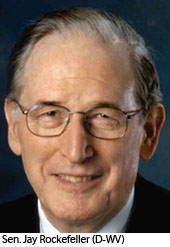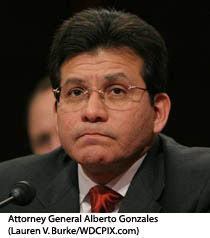In the almost two years that TPMmuckraker has been covering the scandal over the removal of the U.S. attorneys, there have been many questions raised over the reasons behind the firings. On Monday, the Justice Department's Office of the Inspector General's report answered some of those, but raised others. While it concluded that only three of the firings were carried out for political reasons or to interfere with active prosecutions, it could not gather sufficient evidence to conclude the rest of the firings were politically based. Regardless, the report strongly condemned the DOJs overall mishandling of the firings, calling the process "fundamentally flawed . . unsystematic and arbitrary."
As we wrote earlier this week, the report reveals that Todd Graves, David Iglesias and Bud Cummins were fired for reasons of politics, not performance.
The report lays out the investigations into each of the remaining U.S. attorney firings, but repeatedly states that its analysis and investigation were "hindered" due to many witnesses' "lack of recall"; the refusal of many witnesses to cooperate with the investigation or give testimony; and the administration's stonewalling in disclosing documents. Citing these obstacles, the report hedges its findings, requesting a prosecutor to continue the investigation with the power to compel testimony.
In the case of Margaret Chiara, the former Western Michigan U.S. attorney, the report could find no evidence that the rumors that Chiara was in a lesbian relationship with one of her subordinates were behind her removal.
Chiara has stated publicly that she believes the rumors -- which she called "false and malicious" in a statement yesterday from her attorney -- were the reason for the loss of her position.
Carol Lam, the U.S. attorney in the Southern District of California, was believed to have been asked to resign over her prosecution of former Executive Director of the CIA, Dusty Foggo and Brent Wilkes, a defense contractor who bribed former Republican Rep. Duke Cunningham and Foggo. But the report "found no evidence" to support those claims, stating that "the investigation and prosecution of Cunningham and Foggo were aggressively pursued by career prosecutors in Lam's office, both during and after her tenure."
Instead, the report supports the Department's previous claims that Lam was removed because of her poor statistics on gun and immigration prosecution statistics -- but blames the DOJ for poor handling of her removal.
In the case of Daniel Bogden of Nevada, little was known about his removal, except that he had not been diligent in prosecution of obscenity cases. The report found the claim to be behind Bogden's removal, but added some color to the removal. Interestingly, the report found that the complaints of Bodgen's dalliance in obscenity prosecutions were made by Brent Ward, the head of the DOJ Obscenity Prosecution Task Force -- who was friends with Attorney General Chief of Staff Kyle Sampson's brother and had direct conversations with Sampson regularly.
When questioned by the DOJ, Sampson stated he "did not recall whether those complaints played a role in the decision to remove Bogden," a response the report found "particularly suspect, given his role in the removal process."
In Arizona, Paul Charlton's termination was believed to be connected to his investigation of Republican Rep. Rick Renzi, but the report states that it could find no evidence to support that claim. Charlton had previously clashed with Main Justice on a decision he made to not seek the death penalty on a case involving a murder that transpired during a drug deal. Charlton believed it was this death penalty case as well as his policy of tape recording interrogations that led to his removal -- theories the IG report confirmed as the primary reasons for his dismissal.
Lastly, there is Seattle's John McKay who was believed to have been fired over his failure to prosecute voter fraud related to the 2004 Washington governor's election.
McKay famously received a call from Ed Cassidy, chief of staff to Washington Rep. Richard Hastings (R) asking about his prosecution, to which McKay responded, "Ed, I'm sure you're not about to start talking to me about the future direction of this case," after which Cassidy quickly ended the call.
Hastings claimed ignorance and told investigators that "he could not remember telling Cassidy to call McKay. . . or whether Cassidy had told him he had done so."
The report also mentions a meeting in Washington between McKay and White House Counsel Harriet Miers in which Miers reportedly asked McKay "why Republicans in the state of Washington were angry with him."
The report concludes that the "evidence suggests" that the primary reason for McKay's removal was an argument with Deputy Attorney General Paul McNulty over an information sharing program -- not because of failure to prosecute voter fraud as McKay conjectured.
The OIG report, though nearly 400 pages long, is far from comprehensive. The investigation lacked the power to compel testimony or documents outside of the Justice Department and were consequently limited in their investigation. As a result, the report is forced to reserve judgment on whether many of the firings were inappropriately political, though it recommends that a prosecutor be appointed to look into whether crimes were committed.
Nora Dannehy, appointed on Monday by Attorney General Michael Mukasey will take up that mantle. It remains to be seen if that will be enough to ferret the truth out of unwilling witnesses and departments.
















 The OIG Report: Tying Up Loose Ends
The OIG Report: Tying Up Loose Ends White House, DOJ, Domenici Stonewalled IG On Iglesias Firing
White House, DOJ, Domenici Stonewalled IG On Iglesias Firing


